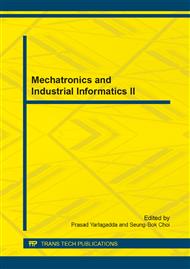[1]
Yugen Liu, Lixiang Wu, Shuo Wang. Practicality analysis for optimized erosion diagnosis of large and grid medium-scale grounding grid [J]. Journal of Chongqing University, 31(4), 2008, 417-420.
Google Scholar
[2]
Wenjing Ma, Bo Zhang, Xushuang Song. Study on corrosion diagnosis method for grounding network based on regularized least square method [J]. Heilongjing Electric Power, 34(4), 2012, 278-284.
Google Scholar
[3]
Yugeng Lin, Yongxi Teng, Xianlu Chen. A method for corrosion diagnosis of grounding grid [J]. High Voltage Engineering, 30(6), 2004, 19-21.
Google Scholar
[4]
Lei Xu, Lin Li. Fault diagnosis for grounding grids based on electric network theory [J]. Transactions of China Electro Technical Society, 27(10), 2012, 270-276.
Google Scholar
[5]
Yang Liu, Xiang Cui, Zhibin Zhao. Design and application of testing magnetic field system for corrosion diagnosis of grounding grids in substation [J]. Transactions of China Electro Technical Society, 24(1), 2009, 176-182.
Google Scholar
[6]
Xiuli Zhang, Ping Luo, Ni Mo. Development and application of electrochemical detection system for grounding grid corrosion state [J]. Proceedings of the CSEE, 28(19), 2008, 152-156.
Google Scholar
[7]
Shengyong Ye, Xiaoru Wang, Zhigang Liu. Power system transient stability assessment based on Support Vector Machine incremental learning method [J]. Automation of Electric Power Systems, 35(11), 2011, 15-19.
Google Scholar
[8]
Qiong Wu, Yihan Yang, Wenying Liu. Electric power system transient stability on-line prediction based on LSSVM [J]. Proceedings of the CSEE, 27(25), (2007).
Google Scholar
[9]
Shangbin Jiao, Ding Liu. Assessment of surface contamination of high voltage insulator based on LSSVM [J]. Automation of Electric Power Systems, 30(6), 2006, 61-65.
Google Scholar
[10]
J. Wang, Z.H. Zhou, A.Y. Zhou. Machine Learning and Application, Tsinghua University Press, Beijing, (2006).
Google Scholar
[11]
Liangshan Qu, Xiaogang Li, Cuiwei Du. Corrosion rate prediction model of carbon steel in regional soil based on BP network [J]. Journal of University of Science and Technology Beijing, 31(12), 2009, 1569-1575.
Google Scholar
[12]
Xiaoyan Ma, Zuyu Qu. Application of artificial neural network in prediction corrosion value of metal in atmosphere [J]. Journal of University of Science and Technology Beijing, 23(2), 2001, 123-126.
Google Scholar
[13]
Zhihu Guo, Zhengliang Xing, Minghu Jin. Predicting corrosion rate of mild steel in soil based on artificial neural network [J]. Journal of Chinese Society for Corrosion and Protection , 16(4), 1996, 307-310.
Google Scholar


